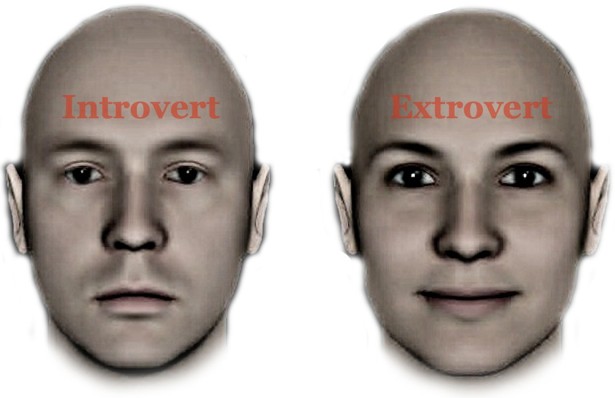The Introverted Face
People put serious weight on judgments of character based on facial structure alone.

There has been a recent boom in research on how people attribute social characteristics to others based on the appearance of faces—independent of cues about age, gender, race, or ethnicity. (At least, as independent as possible.) The results seem to offer some intriguing insight, claiming that people are generally pretty good at predicting who is, for example, trustworthy, competent, introverted or extroverted, based entirely on facial structure. There is strong agreement across studies as to what facial attributes mean what to people, as illustrated in renderings throughout this article. But it's, predictably, not at all so simple.
"The fact that social decisions are influenced by facial morphology would be less troubling if it were a strong and reliable indicator of people’s underlying traits," the researchers write in today's article. "Unfortunately, careful consideration of the evidence suggests that it is not."The primary problem is that people feel they have this sense, and they ignore other relevant information, Olivola said. Politics is a great example. His research has shown that politicians whose facial structure is deemed to look more competent are more likely to win elections. (They use actual politicians in these studies. Fortunately for researchers, Olivola noted, most Americans don't know who most congressional candidates are.) But that sense of competence in a face amounts to nothing. "We really can't make a statement on that," he said. "What's an objective measure of competence?"
Personality traits are also fraught, in that most studies rely on self-reported personality tests. "If I rate myself as extroverted and I try to look it in my pictures, you might rate me that way, but it doesn't mean I am." If there was some actual measure, like that when a person goes to parties, they make X number of friends, then we could start to talk about accuracy. But really, these studies just affirm that people see themselves the same way others see them.
"I'm sure you are," I said.
"So this is kind of dangerous," he continued after a beat. "I mean, is it wise for us to tell people, 'Oh, yeah, people are great at telling political orientation on the basis of faces.' If someone looks like they're conservative, or if they look like they're gay or whatever, it's totally okay for you to think you're probably right? We need to be more careful about that. It makes for great articles and everything, but when you look at the data critically, it paints a much less generous picture of the human ability to draw accurate inferences from faces. We need a lot of strong evidence before putting that message out there."
In an article in Annual Review of Psychology earlier this year, Olivola and a separate group of Princeton colleagues made a similar point about the treacherous grounds on which this research treads. They address that countless papers have recently been written claiming that people can reliably judge a variety of traits and characteristics from facial morphology alone, arguing that a critical reexamination of the methods and findings in many of these studies paint a much less favorable picture. Though in that review, the team concedes that some of these structural cues "could have a kernel of truth," they are largely a judgmental illusion. They note that in criminal cases, facial appearances often predict sentencing decisions, judgments of guilt, and punishment severity. The most interesting, but also troubling, aspects of human judgment and decision making is how fallible and inconsistent it can be. The researchers also offer the additional caveat: "In real-life situations, people do not interact with disembodied faces."
Don't we?







No comments:
Post a Comment
Note: Only a member of this blog may post a comment.